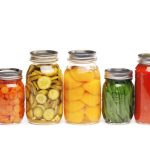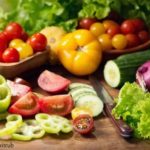In the state of California, as of Tuesday, January 1, 2013, food can legally be produced in home kitchens and sold to consumers. The Homemade Food Act was passed and signed into law in September 2012. Those foods, commonly known as "cottage foods", are illegal to make and sell in many states. Only so-called "low risk" foods are allowed under the new law. They include baked goods, desserts, nuts, candies, and jams and jellies. The California Department of Public Health will oversee the new regulations and will provide food processor training, which anyone who wants to sell food from their home is required to take. All CFOS must obtain approval from local planning departments. Class A CFOs sell directly to consumers, while Class B CFOs can sell to third-party retailers, which then sell … [Read more...]
Shopping at a Farmers Market This Weekend? Buyer Beware.
Farmers markets are booming. In the last 40 years, farmers markets around the country have grown by 2000% as demand for local foods has increased. Farmers markets generating at least $1.3 billion in consumer spending every year. We all know that foods purchased directly from the farmer are fresher, taste better, and are more nutritious. But how safe are those foods? State and local laws about these temporary establishments vary, since each state has its own farmers market regulations. Some vendors are completely exempt from health department inspections, others sell food prepared in uninspected homes, and some farmers markets are inspected by authorities. A study published in Food Protection Trends found that food safety behaviors by vendors at farmers markets are inconsistent at … [Read more...]
Cottage Food Industry Guidance
The cottage food industry is growing in America. This industry, where people make food at home and sell it directly to the public, is limited to foods with a lower potential for foodborne illness, including baked products and jams. The foods can't be sold in retail stores, through the internet, by mail order. The laws and rules governing these sales vary by state, even though the FDA Food Code states that "Food prepared in a private home may not be used to offered for human consumption in a food establishment." It's up to the individual proprietor to make sure she is complying with local and state regulations, including zoning ordinances. So the Association of Food and Drug Officials (AFDO) has prepared a guidance document of "best practices" to help potential entrepreneurs and local … [Read more...]
Cottage Food Industry Approved in Florida
Have you ever wanted to sell food you make in your own kitchen? You're not alone. Home cooks preparing food for public sale is called the "Cottage Food Industry". Some states allow this practice, as long as only "low risk foods" are sold. Yesterday, another county in Florida took the first step toward eliminating state licensing requirements for the Cottage Food Industry. Last year, the Florida legislature passed House Bill 7209, which legalized the sale of foods produced in home kitchens. Cities and counties in states can have different and varying laws on the books, which may or may not follow state law. The foods that are usually allowed under "Cottage Food Production Operations" include: Baked goods Jams and jellies Honey Homemade pasta Flavored vinegars Trail mix … [Read more...]







